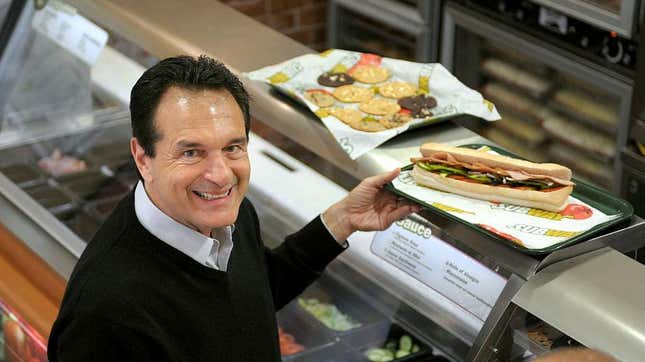
We’ve been following Subway’s persistent decline for years at this point, and it just seems like each passing week shows a system rigged against its own franchisees. But now a new in-depth piece by Insider’s Kate Taylor about Subway’s complicated relationship with its founder, Fred DeLuca, shows that the chain has been struggling with its leadership for a very long time now. DeLuca passed away in 2015 at the age of 67 and left behind a jumbled mess, both in his business and personal lives: it was revealed that he cheated on his wife with multiple franchisees’ wives.
DeLuca started Subway in 1965 as a 17-year-old bootstrapper originally trying to devise a way to fund his own college education. At a barbecue he tried to ask his parents’ friend Peter Buck, a nuclear physicist, for advice. But instead, Buck proposed the two combine forces to open a sub shop. DeLuca would do the groundwork of running the restaurant, while Buck would take care of the funds. By the end of the day, DeLuca wrote in his book, Start Small, Finish Big, he was holding onto a check for a thousand bucks.
The start was rough, but within a decade, despite their struggles, DeLuca managed to pay his way through the University of Bridgeport, and the company originally known as Pete’s Super Submarines had opened 32 locations. Their fortunes changed wildly in the mid-’70s when they hit on the franchise model: independent owners could operate under the Subway name for a franchise fee and 8% annual royalties. (In 2021, Subway has inched the royalty fee up to 10%, which is putting serious strain on businesses that have already struggled through the pandemic.)
Subway began to expand at a breakneck pace. In 1982 there were 200 stores. In 1998 the chain reached the 2,000-store mark, and in 2010, it beat out McDonald’s to become the biggest global restaurant chain, with 33,700 locations. And rumors are currently going around that DeLuca’s widow, Elisabeth (who owns half of Subway), and Buck want to sell the chain altogether.
During DeLuca’s reign as Subway’s leader, he was known to have very few boundaries, if any at all. A business associate told Insider, “If you wore a skirt and had a pulse, he would chase you.” The associate went on to say, “He always felt that he could go and he could approach any woman” at Subway conventions, “because he was responsible for their husband’s success in stores.”
In 2000, the company calendar featured half-clothed male executives posing in various locations, like a shower and a conference room. DeLuca himself was the January model; in his photo, he’s sitting shirtless in his office holding a glass of champagne and a sign that says “executive office” on it.
DeLuca’s former daughter-in-law, Ana DeLuca, recalled his habit of bringing girlfriends around as soon as his wife, Elisabeth, was gone. She added: “Fred could do anything that Fred wanted to do and everybody would just agree, turn their head to the other side,” due to the power and wealth he wielded in the family and the company.
DeLuca left no plan for succession after his passing in 2015, shortly after the chain’s popular spokesman, Jared Fogle, was arrested for distributing child pornography and traveling to have sex with minors. DeLuca’s sister, Suzanne Greco, served as CEO until she was forced out in 2018. (One franchisee called her “a pathetic, poor copy of Fred.”) The board, led by Peter Buck and Elisabeth DeLuca, hired the current CEO, John Chidsey, in late 2019; Chidsey, a former CEO of Burger King, came out of retirement to take the position. He’s slashed over 500 corporate jobs and wrecked relationships with franchisees, much as he did when he was at Burger King.
The Insider piece goes much further in-depth, providing a view into a company whose internal struggles are causing a rift between its corporate leaders and its franchisees. While the pandemic was hard for the chain, it sounds like the trouble started way before then. This is likely not the last Subway bombshell—this story is far from over.